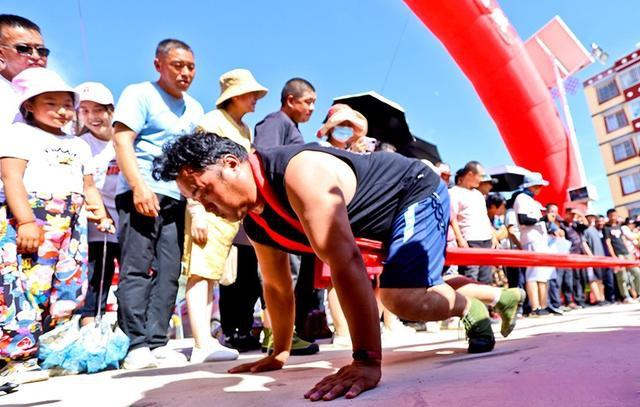Traditional Yugur sports light up summer in NW China

Lapaniu is a traditional sport of the Yugur ethnic group, a group of nomads living at the foot of the Qilian Mountains in Northwest China's Gansu province. Similar to the tug-of-war, this sport requires players to wind a rope around their waist and crawl forward.
Just like the Chinese athletes who are striving to win gold medals at Tokyo 2020, 12-year-old Wang Zihan just won a competition called Lapaniu, also with a concentrated effort.
Lapaniu is a traditional sport of the Yugur ethnic group, a group of nomads living at the foot of the Qilian Mountains in Northwest China's Gansu province. Similar to the tug-of-war, this sport requires players to wind a rope around their waist and crawl forward.
Wang is at the very top among his peers in the game with taller height and greater strength. "It's challenging and great fun, and has become essential entertainment in our summer vacation," he said.
Evolving from traditional grassland entertainment, the nomadic culture has been passed down to younger generations, according to Yugur PE teacher Wang Yanjun, adding that rules have been standardized and equipment has been improved so that more students can share in the sport under safer conditions.
In Lapaniu, the 1-one-1 format has extended to a team battle and the length of rope has been shortened based on the stature of primary school students. Teachers have also tied the soft pads used in other traditional sports in case the youths get hurt.
"The traditional sports that can be played anywhere and use simple equipment have gained in popularity among young people, lighting up their summer life on the grasslands in remote mountain areas," said Wang Fugui, deputy director of a primary school in Sunan Yugur Autonomous County of Gansu.
Yugur people still maintain the lifestyle of keeping cattle and sheep as a main source of income. Every summer, these people are used to herding on high mountain pastures far from downtown areas, but for children who accompany their families to herd, the grassland is more like a "moorland" of recreation.
"Young people now have more things to do to fulfill our time on the grasslands," said 12-year-old sports fan Lan Rui.
Every holiday, Lan would invite some of her peers or relatives to have a race. She said she had unconsciously exercised her muscles and increased her endurance through this training, and hoped such sports can be an an official Olympic event one day.
Kelsang Lhamo, a Tibetan girl, is one of Lan's classmates. She said playing traditional sports has helped her to be more outgoing and make more friends.
The Qilian Mountains, sharply defined under the shining summer sun, rang with the laughter of the youths.
"The traditional sporting culture of ethnic groups is an important part of China's cultural heritage, playing an active role in improving physical and mental health as well as in strengthening friendship between one another," said Wang.
-
As AI encounters Dunhuang's art, the ancient caisson ceiling bridges centuries to the present.
View all stories

 Gansu thrives from green development
Gansu thrives from green development  >
>